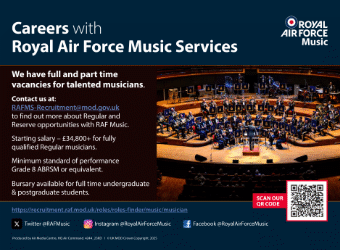Unite the Union was crowned First Section National Champion of Great Britain after defeating their rivals in an engrossing, if somewhat mixed battle of musical chess.
In doing so they became the first band to claim the title on three occasions — the latest following victories in 2001 and 2012. It also saw them add to the recent successes at the British Open Senior Trophy and Yorkshire Area since Jonathan Beatty took the baton in 2022.
A hugely confident band will now look forward to their return to Championship Section status in 2026. On this form they will not be out of place in trying to 'Checkmate' elite level rivals.
Blood-lust
Eric Ball's arrangement of the Arthur Bliss ballet music may lack the visceral colour and emotional power of the 1937 original, yet his skilful appreciation of its preening majesty, followed by its reflective religious calm and ferocious denouement, still fuelled the blood-lust for glory of the 18 competitors.
In the end it was the Yorkshire champion who took the honours — theirs a victory of honest toil and high class contesting virtues; the opening 'Dance of the Four Knights', poised and deliberate, the 'Ceremony of the Red Bishops' to follow, tender and effective.
Even the act of regicide to end was planned with title winning purpose — evenly paced before the murderous act of an exhausted King by 20 sharp-edge ensemble blades and a quartet of 'Yorkshire best' hammer blows.
Crucially it left a lasting imprint in the box, even with more than half the field left to play.
"A terrific performance," was the written verdict of Nicholas Garman, whilst Mark Wilkinson said there was "lots to commend.. confident and well delivered,". David Thornton said that it had maintained "good control and ensemble".
Overload
However, all also pointed out moments of unease and dynamic overload — a theme that Nicholas Garman spoke about in his considered pre-result address. Crucially though in their case, it didn't undermine the musical picture created by Jonathan Beatty's informed intent.
"It's a great piece that has clear story telling in place," Nicholas Garman said. And even with such a well-defined narrative, there was he added, the need to maintain "dynamic contrast — light and shade", to ensure the first movement was not overblown, there was balance in the second to allow lead lines to capture the focus of attention, and rhythmic clarity on the finale to build the tension to its gory close.
He later told 4BR although no band really totally mastered such a difficult test, although the prize-winners and the victors in particular, captured the essence of what Bliss was so vividly portraying.
Colourful celebrations
You suspect the post-results celebrations were equally colourful for Unite the Union players and supporters. It certainly seemed that way after their posted their immediate reactions to their win on their Facebook page.
"WOW! It is a total privilege to compete against the finest First Section Bands in the UK, and to be awarded first placing is overwhelming and an absolute honour! One of the adjudicators remarks read "It gave me goosebumps!... A terrific performance" — compliments don't come much bigger than that."
They added: "We'd like to publicly thank our fabulous Musical Director, Jonathan Beatty — relentlessly hardworking, encouraging, and enthusiastic... and our families for being so supportive and understanding. We're enjoying a well-earned night off band tonight. Some of us might still be recovering from the celebrations..."
They were richly deserved.
Compare and contrast
With the demanding challenges in each of the three 'Checkmate' movements (the addition of the 'Mazurka' wouldn't have really made a huge time difference), it was always going to be a difficult job for the judges to compare and contrast the varied approaches from the MDs and their bands.
In the end they opted for a high energy, high contrast account from Kidlington led by Jonathan Pippen; colourful and pacy to open, tender and mysterious in its ceremonial reflection. A frantic, harrying murder closed an account that certainly set out what it wanted to achieve from start to finish.
In contrast, the more refined (but equally murderous) intentions of Melvin White and Thundersley was third. Theirs was a more studiously planned attack, perhaps the most authentically balletic in nature of the day.
Nearly but not quite
Behind them came a top-six that almost, but not quite, hit the very top of their form.
Parc & Dare upheld Welsh honour to finish fourth, ahead of the West of England pairing of Michelmersh Silver and Roche Brass. Each emerged from the battle in credit, even if it was obvious that they also spilt quite a bit of claret in their hard working efforts to claim the ultimate prize.
A little further back came a confident Newtongrange ahead of solidly portrayed accounts from Freckleton, Diggle (whose trombone player Gary Burgess took the 'Most Outstanding Player' accolade) and Tyldesley.
They arguably lost their opportunity for title consideration with a finale that showed why in the original, the Black Queen was a model of cold hearted virtuosity, rather than red blooded freneticism in her destruction of the feeble Red King.
Few complaints
For the remaining bands, it was, as it has been for some considerable time, a contest that highlighted the true level of First Section banding — one closer to the true level of the Second Section than it is of the Championship.
From Glastonbury down the judges would have noted the inconsistencies in execution as well as the more basic problems of intonation, dynamic balance and pacing. There were few complaints you felt.
There were certainly none from the newly crowned Champion.
Iwan Fox
Even the act of regicide to end was planned with title winning purpose — evenly paced before the murderous act of an exhausted King by 20 sharp-edge ensemble blades and a quartet of 'Yorkshire best' hammer blows4BR
Result:
First Section:
Four Dances from Checkmate (Arthur Bliss arr. Eric Ball)
Adjudicators: Nicholas Garman; Dr David Thornton; Mark Wilkinson
1. Unite the Union (Jonathan Beatty)
2. Kidlington Concert (Jonathan Pippen)
3. Thundersley (Melvin White)
4. Parc & Dare (Dewi Griffiths)
5. Michelmersh Silver (Kevin Smith)
6. Roche (Matt Green)
7. Newtongrange Silver (Anne Crookston)
8. Freckleton (Adam Taylor)
9. Diggle (Sean Conway)
10. Tyldesley (Neil Samuel)
11. Glastonbury (Liam Grunsell)
12. Audley (Tom Hancock)
13. Tylorstown (Nigel Seaman)
14. Raunds Temperance (John Hudson)
15. Granite City (Bruce Wallace)
16. Ripon City (Garry Hallas)
17. Old Silkstone (Norman Law)
18. Cockerton Prize Silver (Andrew Hunter)
Most Outstanding Player: Gary Burgess — trombone (Diggle)



















